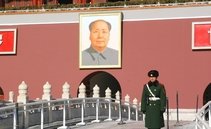China can count on extra-large funds that manage the disproportionate figure of $2 trillion and which are responsible for financing the entire economic engine of the country.

What is a sovereign wealth fund? A public investment vehicle owned by a government that is used to invest fiscal surpluses or foreign exchange reserves in stocks, real estate, bonds, and other assets. China can count on extra-large funds, commensurate with its enormous economic potential; they manage the disproportionate sum of $2 trillion and finance the entire machine of the Asian giant, defined by analysts as CCP Inc.
Zongyuan Zoe Liu, author of the book Sovereign Funds: How the Communist Party of China Finances Its Global Ambitions, and researcher at the Council on Foreign Relations, spoke about it in detail. To date, Beijing has used the enormous amount of dollars it has accumulated - thanks to trade with the West - to support its economy when it is in danger, and to extend its financial reach globally in good times.
How? Using the leverage of sovereign wealth funds (SWFs). “If US policymakers fail to understand the political-economic model of China’s sovereign wealth funds and how they advance the global ambitions of the Chinese Communist Party (or CCP), the United States risks relinquishing its leadership in financial markets earlier than expected, and in unexpected parts of the world,” the author explained to Foreign Policy.
From this point of view, it is worth underlining how the SWFs no longer intend to invest national financial reserves in low-yielding but safe US Treasury bonds, but rather in riskier but equally profitable sectors. Well, given the new Cold War underway between Washington and Beijing, Chinese investments have ended up in the eye of the storm and aroused numerous suspicions in the corridors of Western chancelleries.
The rise of Chinese sovereign wealth funds
It is interesting to reconstruct how Chinese sovereign wealth funds were born. Liu’s volume explains it in a simple, clear, and exhaustive way. During the Asian financial crisis of 1997-1998, officials in Beijing watched as their neighbors’ economies collapsed as foreign investors fled elsewhere with the dollars they had brought there, leaving multiple governments unable to pay their foreign debts.
Around that time, China blocked capital outflows, threatened to jail anyone who took greenbacks abroad and began accumulating dollar reserves from its huge trade surplus. The Eastern giant continued to accumulate money until it reached $1.1 trillion in reserves in 2006 (at the time a huge sum, equal in size to the size of Brazil’s economy).
At that point, the Chinese Ministry of Finance decided to stop purchasing US Treasury securities and invest the money elsewhere. In 2003, meanwhile, China created Central Huijin Investment, which invested tens of billions of dollars to free the country’s largest state banks from nearly all of their bad debt.
Ok, but what to do with the rest of the money? Some officials speculated about using it to finance the expansion of the country’s social safety net (including the pension fund). Others called for the creation of a reserve of strategic resources. Eventually, the Ministry of Finance would pump $200 billion into a new fund, China Investment Corp (CIC), tasked with investing abroad. CIC incorporated Central Hujin and controls $1.35 trillion in investments.
leggi anche
A job crisis is shaking China

The importance of Chinese funds
Let’s take CIC. He first invested billions of dollars in Wall Street titans Morgan Stanley and Blackstone, then in Canadian energy companies. Over time, China’s sovereign wealth funds began to play an important role in the national economy. Six times, between 2008 and 2015, the aforementioned Central Huijin pumped in a total of more than $150 billion to support Chinese stock markets when they seemed ready to collapse.
CIC has instead become a large investor in tech start-ups in the country, including e-commerce giant Alibaba and ride-hailing app Didi Chuxing. It has also invested more than $250 million in the country’s top chipmaker, Semiconductor Manufacturing International Corp, as well as other technologies included in China’s five-year plans. In short, Beijing’s nationwide SWFs have aligned themselves with the plans of the state and the Chinese president Xi Jinping.
Liu argues in his book that Chinese SWFs are Beijing’s secret weapon to promote its economic agenda abroad. “They empower the state to move and even shake the market by making selective equity investments that advance its industrial policies and geoeconomic interests,” he explained. What is certain is that, due to international tensions, investment opportunities for the aforementioned funds in the United States, Europe, and other rich nations are reducing, while fears over China’s global ambitions are growing in the West.
Original article published on Money.it Italy 2024-07-15 06:43:00. Original title: Il segreto economico della Cina? I suoi fondi sovrani




